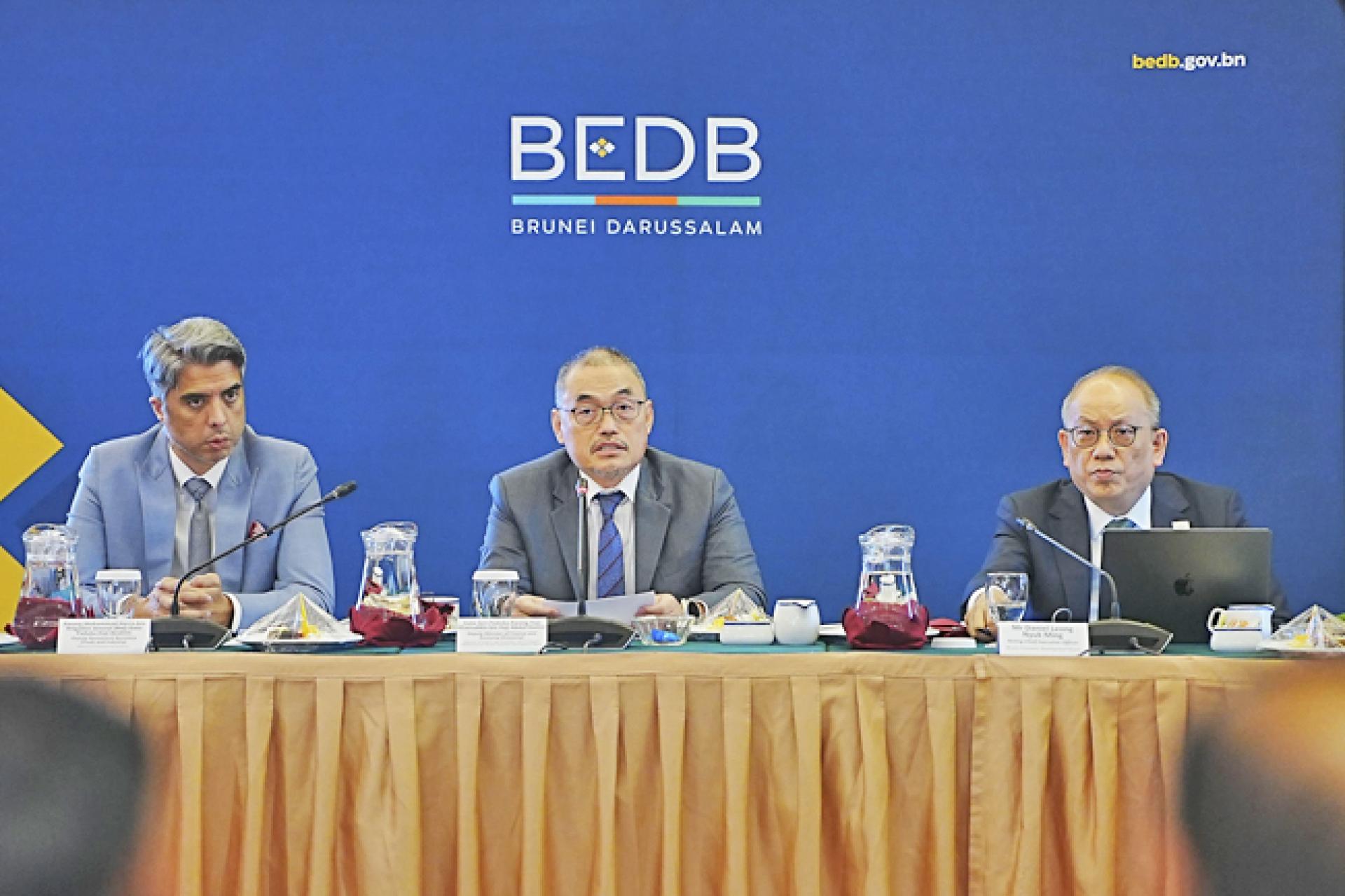(Bandar Seri Begawan, 12th) Brunei’s Deputy Minister of Finance and Economy and Joint Vice Chairman of the Brunei Economic Development Board (BEDB), Dato Seri Paduka Dr. Abdul Manaf Metussin, stated that public and private sectors need to deepen cooperation to promote the food industry as one of the five priority development areas under the nation’s economic diversification strategy.
He made these remarks during the "MSME Roundtable Series" on Thursday, emphasizing that such meetings should serve not only as communication platforms, but also as catalysts for sustainable, practical actions and policy coordination.
"This provides us with a strategic platform to formulate balanced and pragmatic solutions, helps drive innovative development, and clearly guides the future economic direction of the country," he said.
During the event, multiple business representatives shared their current operational challenges and provided key suggestions for support, including simplifying government business processes, sharing production facilities, promoting joint procurement, and integrating logistics to improve cost efficiency.
Chairman of the National Chamber of Commerce and Industry Brunei Darussalam (NCCIBD) and Brunei Representative of the ASEAN Business Advisory Council (ASEAN-BAC), Abdul Saman, pointed out that exports remain one of the major difficulties faced by micro, small, and medium enterprises (MSMEs). Citing shipping experience, he suggested that SMEs reduce transport costs through freight consolidation and collective export arrangements.
According to the "2023 Annual Business Census Report" published by Brunei’s Department of Economic Planning and Statistics, MSMEs account for 97.6% of all active enterprises in Brunei, absorbing 57.5% of private sector labor force, and play a key role across the food processing, retail, and service chains.
The roundtable highlighted that, despite Brunei still relying on imports for the majority of its food, local MSMEs face three major constraints: scale, regulatory compliance, and market access. Enhancing local productivity, strengthening supply chain resilience, and supporting domestic enterprises are therefore imperative.
This meeting was centered on the "Brunei Food Industry Roadmap," which covers seven strategic directions, including capacity building, infrastructure development, governance reform, and sustainability, aiming to make the food industry a key driver for national economic transformation.
Looking internationally, the global halal food market is expected to surpass USD 2.5 trillion by 2030. Brunei, with internationally recognized halal certification and food safety standards, possesses clear competitive advantages in the export of high-quality halal foods.
According to a market report released by Grand View Research in March this year, the global market size for halal food and beverages is projected to grow from USD 803 billion in 2022 to over USD 1.06 trillion by 2030, with growth driven mainly by demand from Asia, the Middle East, and Europe.
The "MSME Roundtable Series," as a long-term cooperation platform between government and businesses, is committed to developing feasible policies and pragmatic strategies. This meeting, themed "Unlocking Growth Potential in Brunei’s Food Industry," was hosted by BEDB and jointly organized by multiple parties, including the National Chamber of Commerce and Industry Brunei Darussalam (NCCIBD), the ASEAN Business Advisory Council (ASEAN-BAC) Brunei Chapter, the APEC Business Advisory Council (ABAC) Brunei Chapter, and the Brunei-Indonesia-Malaysia-Philippines East ASEAN Growth Area Business Council (BEBC).
"This provides us with a strategic platform to formulate balanced and pragmatic solutions, helps drive innovative development, and clearly guides the future economic direction of the country," he said.
During the event, multiple business representatives shared their current operational challenges and provided key suggestions for support, including simplifying government business processes, sharing production facilities, promoting joint procurement, and integrating logistics to improve cost efficiency.
Chairman of the National Chamber of Commerce and Industry Brunei Darussalam (NCCIBD) and Brunei Representative of the ASEAN Business Advisory Council (ASEAN-BAC), Abdul Saman, pointed out that exports remain one of the major difficulties faced by micro, small, and medium enterprises (MSMEs). Citing shipping experience, he suggested that SMEs reduce transport costs through freight consolidation and collective export arrangements.
According to the "2023 Annual Business Census Report" published by Brunei’s Department of Economic Planning and Statistics, MSMEs account for 97.6% of all active enterprises in Brunei, absorbing 57.5% of private sector labor force, and play a key role across the food processing, retail, and service chains.
The roundtable highlighted that, despite Brunei still relying on imports for the majority of its food, local MSMEs face three major constraints: scale, regulatory compliance, and market access. Enhancing local productivity, strengthening supply chain resilience, and supporting domestic enterprises are therefore imperative.
This meeting was centered on the "Brunei Food Industry Roadmap," which covers seven strategic directions, including capacity building, infrastructure development, governance reform, and sustainability, aiming to make the food industry a key driver for national economic transformation.
Looking internationally, the global halal food market is expected to surpass USD 2.5 trillion by 2030. Brunei, with internationally recognized halal certification and food safety standards, possesses clear competitive advantages in the export of high-quality halal foods.
According to a market report released by Grand View Research in March this year, the global market size for halal food and beverages is projected to grow from USD 803 billion in 2022 to over USD 1.06 trillion by 2030, with growth driven mainly by demand from Asia, the Middle East, and Europe.
The "MSME Roundtable Series," as a long-term cooperation platform between government and businesses, is committed to developing feasible policies and pragmatic strategies. This meeting, themed "Unlocking Growth Potential in Brunei’s Food Industry," was hosted by BEDB and jointly organized by multiple parties, including the National Chamber of Commerce and Industry Brunei Darussalam (NCCIBD), the ASEAN Business Advisory Council (ASEAN-BAC) Brunei Chapter, the APEC Business Advisory Council (ABAC) Brunei Chapter, and the Brunei-Indonesia-Malaysia-Philippines East ASEAN Growth Area Business Council (BEBC).
